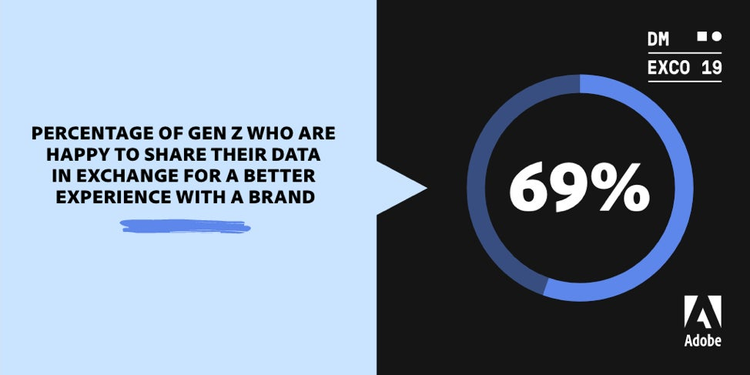Generation Z, defined as consumers born in the mid-1990s to early-2000s, is a dream target for brands.
Generation Z, defined as consumers born in the mid-1990s to early-2000s, is a dream target for brand marketers.
These young customers—the first generation to grow up entirely in the digital age—are hungry for digital content and experiences that speak directly to their needs, and they are open to using new technologies to consume relevant information.
In fact, more than two-thirds (69%) indicated they are happy to share their personal data with companies in exchange for a better customer experience. This was just one of the central findings from new Adobe research titled, “Across The Generations,” which surveyed 1,200 UK consumers evenly distributed across Gen Z, Millennials, Gen X and Baby Boomers.
Of the generations surveyed, Gen Z was also found to be most influenced by online advertising, with 52% frequently engaging with companies that place ads online, compared to 30%, on average, across other age groups.
The research also found that Gen Z is the savviest cohort, in terms of the data they choose to share online. In fact, 33% are taking an active role in configuring data preferences on social networks, compared with 29% across other age groups. And, if they don’t receive the experiences they expect, 21% said they’ll hold back on sharing their data.
Brands need to build trust by being open about how they use personal data, and clear about the added value it enables them to deliver.
Baby Boomers On Guard
For their part, Baby Boomers—those born between 1946 and 1964—are least likely to share their data online, with just 17% believing that brands will “do the right thing“ with their data. Seventy-one percent of Boomers in the UK said they make a point of unsubscribing from brand emails they are no longer interested in, and 54% make sure to change their passwords as a protective measure. By comparison, just 32% of Gen Zers bother to modify their passwords as frequently.
Additionally, while more than 80% of Boomers are happy to share their names with a brand, just 8% will go as far as sharing details around their race, gender, or age.
And, despite being more pragmatic about the information they share, they are happy to receive financial incentives—more so than experiences—in exchange for their personal details. In fact, the survey found that Baby Boomers are the most willing to swap their data for a discount or special offer (73%). It is important to note, however, that the appeal of a good deal applies across the ages (60%), although Gen Z are the least likely to expect discounts and special offers in exchange for their data (47%).
Millennials In The Middle
The Millennial generation, long considered the focal point of spending power for marketers, finds itself at a crossroads between two worlds when it comes to their trust in digital channels and use of social media.
Across Europe, more than 40% of Millennials—people born between 1977 and 1995—said they place more trust in online media than they do in any other channel, putting them in alignment with Gen Z’s outlook. However, the majority of Millenials are still more trusting of television and broadcast media, in line with Baby Boomers.
The same is true of their approach to social media. Like Gen Z, Millennials are nearly as receptive to content and ads shared via social platforms, with more than half surveyed saying they are happy for brands to interact with them there. However, Millenials use different social channels than Gen Z, favoring Facebook and WhatsApp over Instagram, which is the clear leader among digital natives.
Altogether, this makes the Millennials a challenging group to engage with. They are digitally savvy, so they’re a prime target for online and mobile experiences, but they also remain somewhat skeptical when it comes to the content they consume on these channels.
Gen X: Open But Cautious
Straddling the line between Millennials and Baby Boomers is Generation X – those born between 1965 and 1976. While they embrace online content and experiences, they tend to lean towards caution when it comes to protecting their data.
For instance, half of Gen Xers are happy to interact with companies on social media, which distinguishes them from Baby Boomers. However, they rarely engage with companies who advertise on these platforms, with less than one third of consumers in this age group saying they do so frequently. Meanwhile, roughly half of Gen Zers and Millennials admitted they often interact with brands who target them on social channels.
Similarly, more than half of Gen Xers said they tend to unsubscribe from brand emails that no longer interest them, and more than 40% change their passwords to protect their personal data. While they are as digitally-inclined as Millennials, people in Generation X need more reassurance when it comes to the dynamics of online targeting, a point which brands must factor in when adapting their campaigns to this group.
Many Sizes To Fit All
Brands may be focused on engaging Gen Z and tailoring their experiences to the digital generation, and with good reason. But as Adobe’s survey reveals, consumers across the board spend a great deal of time consuming digital media, and older generations have more spending power than young consumers.
The challenge is to find a happy medium between innovation, personalization, and trust. With the right framework in place and a commitment to helping customers understand how their data fuels better digital experiences, companies will be able to adapt and deliver valuable content to the right people, at the right time, in a way that that the customers feels relevant and trustworthy.

